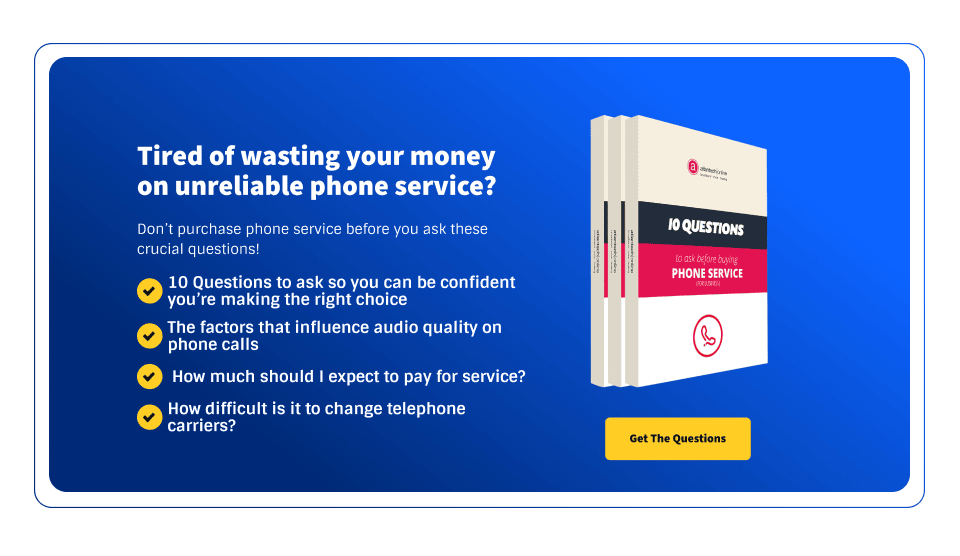6 Benefits of VoIP: Everything You Need to Know

Any business with a concern about efficient and cost-effective solutions for telecommunications has likely been informed that Voice over Internet Protocol (VoIP) telephone systems are the best choice in today’s Internet-driven society.
As best as anyone can tell at first glance, it seems like VoIP phone services are answering many, if not all, of the primary communication needs companies require from telephone systems.
However, it doesn’t take long to run into conflicting advice. At Atlantech, we are often asked to clarify confusion about VoIP telephone systems that arise from this. People want to know if VoIP communication solutions like Microsoft Teams Calling are as useful as they claim to be.
This article highlights what VoIP is, and the six benefits of VoIP so you can make an informed decision for your business.
Benefits of VoIP: What is a VoIP Telephone System?
VoIP stands for voice-over-internet protocol. Essentially, a VoIP telephone system is a type of phone system that transmits calls over an internet connection.
A VoIP phone system takes voice data and converts it into digital files that can be transmitted, then decoded by the receiver’s phone on the other end of the call.
What are the benefits of a VoIP telephone system over a traditional phone system? As it turns out, there are many potential benefits to switching to a VoIP telephone system. Let’s look at some of the ways making this change can decrease cost and time investments while increasing productivity.
Related: SIP vs. VoIP: Which is Best For Your Business?
6 Benefits of VoIP
- Low Cost-Per-Call
- Service Mobility
- Versatility of Features
- Simple Conference Calls
- Efficient Client Interaction
- Reliable in a Pinch
1. Low Cost-Per-Call
As part of the name suggests, a VoIP telephone system utilizes Internet Protocol to make calls. Instead of using telephone lines, all communication data is turned into packets and sent over the IP network.
The IP network your business uses could be your Internet connection, a direct IP connection to your telephone service provider, or a combination of both.
The important part of the IP connection is that there is guaranteed quality of service (QoS) from your telephone service provider’s network to your office network.
Note: if you are using the Internet to connect to your telephone service provider (going "over the top"), QoS is not possible.
Placing calls over traditional phone lines means that a line is taken up by the two callers using it to communicate. Since there are only so many lines that can be installed, calls placed over landlines, especially if they are long-distance, are expensive.
But using the internet to relay call data circumvents this problem, making domestic and long-distance calls cheaper overall.
In fact, using VoIP for business gives you the ability to make domestic and domestic long-distance calls at no additional cost. If the phone number that is chosen for the business is in the United States, for example, providers often allow all calls within the "lower 48" in the United States for free.
How much can VoIP save your business? Switching to a VoIP system saves small businesses up to 45 percent on their monthly phone costs.
2. Service Mobility
If your business is on-the-go, VoIP services can be a tremendous benefit to you because they will follow you wherever you go.
On a traditional phone system, a line that runs to a home or business is assigned its own phone number. Any movement that takes place then becomes a trial of remembering the right codes or keys to dial on your phone.
A lot of time can then be wasted by contacting phone companies to transfer services and phone numbers to new locations.
With a VoIP phone system, all of this is eliminated. There are no physical limitations. You have the freedom to move as your business demands without any added stress.
3. Versatility of Features
Using VoIP phone systems allows you to multi-task with tech-savvy devices, allowing you to be the most productive you can be.
Suppose you are on a call within a queue. While you are waiting, you can strategize your approach to client calls you have missed as you read voicemail-to-text transcriptions that are sent directly to your email inbox.
Related Read: The Best Office Phone Systems Have These 7 Features and Pricing
In another case, you can forward messages and voicemail easily. If you receive an important message in a voicemail, you can forward that voicemail to three other people at the click of a mouse.
These features and many more are available with VoIP phone systems. And because the service always goes with you, the features you find helpful can be added or subtracted with ease. In short, VoIP telephone systems grow with your business.
4. Simple Conference Calls
Since all calls use a converged data network instead of dedicated phone lines, creating and participating in conference calls are made much easier.
It’s possible to take part in conference calls if your business uses a traditional phone system, but what you will find is that you will have to pay for an additional service to host multiple callers for a conference.
These services are native to many VoIP phone systems. Instead of paying for something extra, you can take advantage of the ability to make conference calls as an added benefit to the service you already pay for.
Related Read: Microsoft Teams vs. Zoom: Which Provides Better Remote Meetings
Not only that, but VoIP services make video conferences much easier as well. Of course, these sorts of conferences are usually special cases, but face-to-face interaction with colleagues and clients, while business personnel are out of the office, is much more manageable with VoIP phone systems.
5. Efficient Client Interaction
In today’s global economy, businesses can be located anywhere. This often means that meetings require travel. Even so, with a VoIP service, there is no reason to lose the ability to conduct important calls or to fail to forward essential documents.
In the last few months, you may have noticed that major companies like Coca-Cola and JPMorgan Chase have eliminated voicemail. While this sort of move may not be appropriate for every business, some companies have apparently found that answering voicemails just takes up too much time.
With a VoIP phone system, you can choose where your calls ring and how. For instance, you might select the first few rings to be forwarded to your office. If you don’t answer the call, it will then be transmitted to a second or third device, say, a mobile phone or laptop.
Quite simply, urgent calls don’t need to be missed anymore.
Important documents that need to be forwarded no longer have to wait either. Using VoIP, business associates can fax their documents over the cloud instead of waiting a day (or several) to get to a fax machine.
6. Reliable in a Pinch
A common worry that surfaces about VoIP is the fact that if the internet stops working, so does the ability to make calls. This doesn’t have to occur under the right circumstances. The truth is that call-forwarding, like other features in VoIP phone systems, is incredibly flexible.
No phone system has 100 percent uptime, but VoIP phone systems generally achieve “five nines,” meaning most providers have enough redundancies to achieve 99.999 percent uptime with VoIP.
The capability to choose where your calls are forwarded, and how, means that you also don’t have to lose productivity because of local power outages or weather-related events. If the office phone can’t be answered, your mobile device or laptop can.
Is a VoIP Telephone System Right for Your Business?
Understandably, any recommendation that requires wholesale shifts in how companies conduct business sounds too risky. Considering a move to a VoIP phone system can be confusing with all of the services and features that are available.
Sifting through pages of fine print doesn’t contribute to making the right decision either.
It’s always best to have a knowledgeable, reliable advisor on hand to assist you with major business decisions like this one. Our advisors at Atlantech can assist you with choosing the best phone system for your specific needs and help you implement any changes in the most efficient way possible.
To ensure you’re making the right decision when it comes to your business phone system, use our free resource, The Essential Guide to Business Phone System Pricing! Review the eight features that influence business phone pricing and confidently make the right phone choice for your budget.

